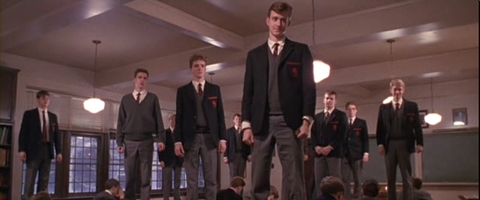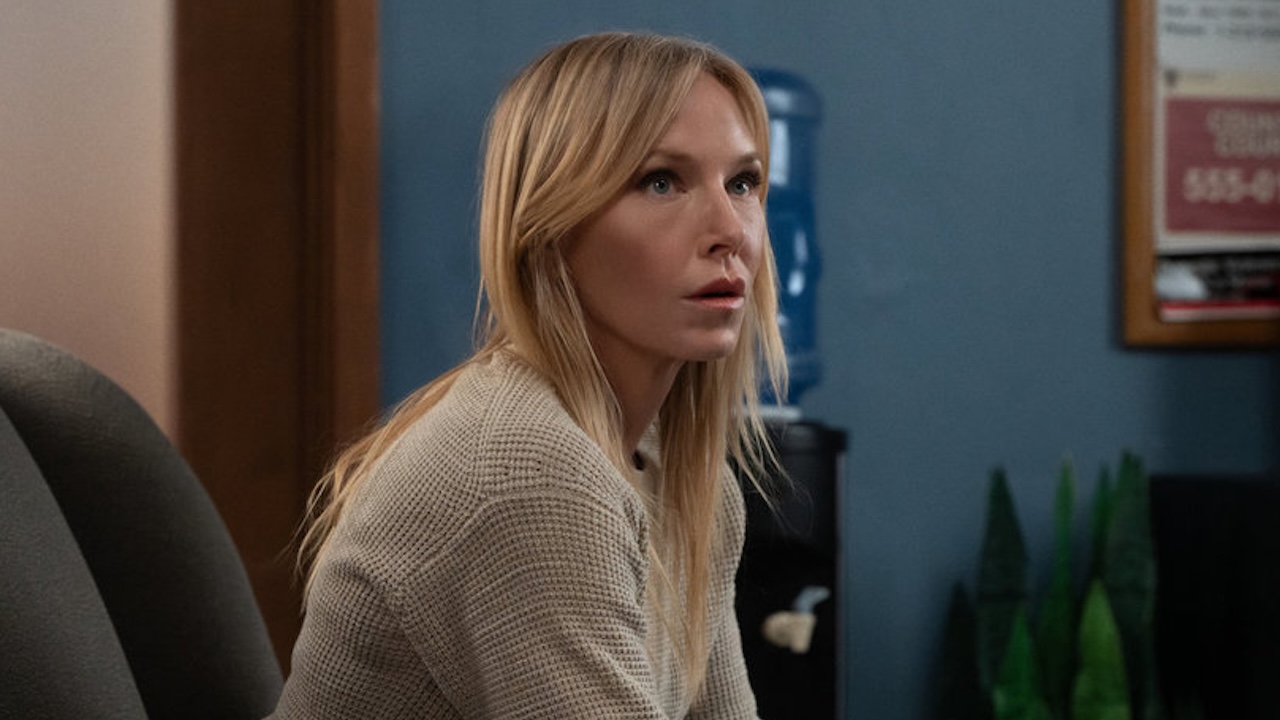In its first moments, Dead Poets Society is a snapshot of tradition. Young men and boys dressed primly listen attentively in a grave hall marked with banners and flourishes. The only real input required from them is to speak out about Welton Academy’s four pillars: tradition, honor, discipline, and excellence. This austere view of the school is only broken once: when new professor John Keating (Robin Williams) is announced. Those of us who have seen the original theatrical trailer for Dead Poets Society might remember the focus is on Williams' portrayal of Keating. A mad and maddening teacher of poetry, Keating once went to Welton and has returned to impart his own ideas about poetry and life in general on his students. Do not misunderstand me; Keating is an integral part of the Dead Poets Society, but he is also just the catalyst for change in an environment that has feared change since it made its very first mark on the world.
Responding to Keating’s influence is a group of ragtag boys with different personalities, opportunities, and social skills. Some of these boys are looking to strike out and make their own mark, but they haven’t got a clue what that means. There is Neil (Robert Sean Leonard), an actor at heart whose overbearing but loving father (Kurtwood Smith) would rather he put his head down and learn to be a doctor. There is shy Todd (Ethan Hawke), who has always been a shadow compared to his brother’s achievements. There is Knox (Josh Charles) a hopeless romantic, and Richard (Dylan Kussman), who just wants to get his answers right.
One afternoon, the boys sneak into the library and find a copy of Keating’s Welton annual. They notice the phrase “Dead Poets Society” listed next to Keating’s name in the book. What follows are nights where the boys retreat to an old Indian cave to recite poetry, entice the occasional girl, and get up to a little hootenanny. Slowly, changes are made in many of the boys’ lives. Todd grows a little more bold and finds he has a knack for poetry. Knox declares his love for a girl named Chris. Neil decides to defy his father’s wishes and take a part in a local production of A Midsummer Night’s Dream.
It’s a tough pill to swallow when it doesn’t all pan out like we would expect. Neil never talks to his father about the play, and when he’s caught, he makes a fateful decision that alters the lives of his friends, his family, and his school. It’s a decision the administration at Welton thinks requires a scapegoat. They look to Richard -- who always needs to have the right answers -- and, in placing answers before loyalties, finds himself to be a snitch. By the end of the movie, the boys don’t all find the perfect answers. They have learned life can be more than a little unfair and have moved forward in spite of it.
When the boys make their way back from the cave the one last time, holding lanterns to light their way home, it suddenly strikes me: the Dead Poets Society is about finding your own path. Not necessarily traipsing down a new path or making some great changes to the state of humanity. We won’t all be doctors or actors or writers of great achievement, but we will all have to find our places in the big, brave world. If we are lucky, we have learned from our own Mr. Keatings. If we are very cognizant, perhaps we’ve learned to keep at least a little Mr. Keating in ourselves. The first extra goes a long way toward explaining what working on a set with Peter Weir is really like. Called “Dead Poets: A Look Back,” the segment features interviews from Kurtwood Smith, Ethan Hawke, and other cast members about their specific experiences with working with Weir.
Instead of deleted scenes, the second extra is “Raw Takes.” These couple of scenes focus on a Dead Poets meeting after Neil’s performance in A Midsummer Night’s Dream. There are so many outtakes from this movie, I would have liked to have seen more.
The next two segments pay proper laud to other integral parts of the Dead Poets Society crew. The first, “Master of Sound,” speaks about Alan Splet, who had a skill at finding sounds that married to pictures. The second crew homage is one about the cinematography. It discusses how scenes were set up and what lights were used in what position, etc. This segment is extremely long and shot with a backdrop of weird '80s electronic music which only helps to date the piece further.
Your Daily Blend of Entertainment News
The biggest problem with the disc is they didn’t bother to do anything new since the “Special Edition” DVD release that came out back in 1998. Missing are a ton of deleted scenes and a full director’s cut of the film that was once released on laser disc (which featured scenes like Knox and Chris kissing). It would have been great if they had revamped the film for Blu-Ray and offered a director's cut of the film, or at least, shown more extra scenes in the “raw takes” section.
As it stands, the Blu-Ray picture looks to be cleaned up rather well and the features are alright. If you don’t own a copy of Dead Poets Society, I would still recommend the disc. If you are already a proud owner, there’s nothing on the disc to make the jump to Blu-Ray a must-have.

